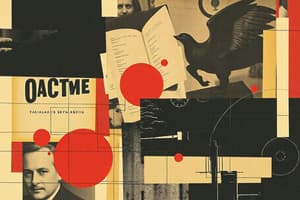Podcast
Questions and Answers
What must be enabled to use Google Drive?
What must be enabled to use Google Drive?
- Flash Player
- VPN
- Cookies
- JavaScript (correct)
Which of the following is NOT explicitly mentioned as part of the content discussed?
Which of the following is NOT explicitly mentioned as part of the content discussed?
- Origin and Development of Structuralism
- Structuralism as a Literary Theory
- Post-Structuralism (correct)
- Structural Linguistics
Which category is associated with language teaching?
Which category is associated with language teaching?
- Structural Linguistics (correct)
- Psychoanalytic Criticism
- Narrative Theory
- Deconstruction
What is indicated as an activity related to the shared course?
What is indicated as an activity related to the shared course?
Which of the following views deconstruction as an endpoint?
Which of the following views deconstruction as an endpoint?
What character represents Faustus' potential for redemption?
What character represents Faustus' potential for redemption?
Which tragic element is exemplified by Faustus' overreaching ambition?
Which tragic element is exemplified by Faustus' overreaching ambition?
What consequence does Faustus face due to his ambition?
What consequence does Faustus face due to his ambition?
What primary theme is highlighted through Faustus' actions throughout the narrative?
What primary theme is highlighted through Faustus' actions throughout the narrative?
Which character serves as a representation of temptation in Faustus' life?
Which character serves as a representation of temptation in Faustus' life?
Which character serves as a representation of Faustus’ internal conflict between salvation and damnation?
Which character serves as a representation of Faustus’ internal conflict between salvation and damnation?
What is a consequence of Faustus’ trivial use of his powers?
What is a consequence of Faustus’ trivial use of his powers?
What theme illustrates the tragic consequences of Faustus' choices?
What theme illustrates the tragic consequences of Faustus' choices?
Which character provides comic relief and signifies Faustus' moral decline?
Which character provides comic relief and signifies Faustus' moral decline?
What does Faustus experience as he approaches the end of his pact with Mephistopheles?
What does Faustus experience as he approaches the end of his pact with Mephistopheles?
How does the character of Mephistopheles primarily function in the narrative?
How does the character of Mephistopheles primarily function in the narrative?
What theme revolves around the exploration of individual choices and their repercussions?
What theme revolves around the exploration of individual choices and their repercussions?
What is the primary focus of Faustus' tragic flaw?
What is the primary focus of Faustus' tragic flaw?
What aspect of Dr. Faustus' character most closely aligns him with the concept of the tragic hero?
What aspect of Dr. Faustus' character most closely aligns him with the concept of the tragic hero?
Flashcards are hidden until you start studying
Study Notes
Structuralism and Linguistics
- Structuralism emerges as a key theoretical framework in the early to mid-20th century, influencing various fields including literature, linguistics, and philosophy.
- Originated from linguistic theories, particularly those of Ferdinand de Saussure, which emphasized that meaning in language arises from the differences between words rather than their direct correlations to objects or ideas.
Deconstruction in Literary Theory
- Deconstruction challenges traditional interpretations of texts, advocating for an understanding that recognizes inherent contradictions and ambiguities.
- It posits that meanings are not fixed but can shift depending on context and perspective, making texts open to multiple interpretations.
Influence on Language Teaching
- Structural linguistics has influenced language education by prioritizing the understanding of language structures, promoting systematic approaches to teaching syntax, semantics, and phonetics.
- Emphasizes the importance of context in teaching language, recognizing that language is a system of signs where meaning is relational.
Key Figures
- Ferdinand de Saussure: Swiss linguist whose ideas laid the groundwork for structuralism.
- Jacques Derrida: French philosopher prominent for developing the concept of deconstruction, impacting literary criticism and analysis.
Transition to Other Theories
- Structuralism served as a precursor to post-structuralism and deconstructivism, which further interrogate the nature of meaning and interpretation in texts.
- The movement has led to questioning absolute truths and has fostered a more critical approach to understanding culture, literature, and language.
Character Analysis
- Dr. Faustus: An ambitious scholar who seeks knowledge and power beyond human limitations through necromancy, illustrating the dangers of hubris.
- Mephistopheles: A demon who embodies temptation; illustrates the dire outcomes of Faustus' decisions and serves as his guide into the abyss.
- Valdes and Cornelius: Faustus’ associates who bolster his inclination towards dark magic, highlighting the influence of peer pressure in moral decline.
- Wagner: The servant of Faustus who provides humor while also signifying the trivialization of Faustus' noble pursuits as his morality deteriorates.
- The Good Angel: Symbolizes Faustus' conscience and the potential for salvation, representing the internal struggle between good and evil.
- The Evil Angel: Acts as a catalyst for Faustus’ downfall, emphasizing the allure and seduction of sin.
Tragic Elements
- Hubris: Faustus’ excessive pride leads him to make a fateful pact with the devil, representing a classic tragic flaw.
- Reversal of Fortune: Faustus transforms from a figure of great potential to one engulfed in despair as he faces the repercussions of his choices.
- Catharsis: The emotional journey evokes pity and fear, as audiences witness Faustus’ internal conflict and its tragic resolution.
- Inevitability: Faustus’ tragedy is preordained, as the decision to make a pact with Mephistopheles seals his fate from the beginning.
Themes of Ambition
- Quest for Knowledge: Faustus’ insatiable desire to acquire knowledge drives him to make ethically dubious decisions.
- Consequences of Overreaching: The pursuit of god-like powers leads Faustus to eternal damnation, illustrating the perils of overambition.
- Duality of Ambition: Ambition is depicted as a double-edged sword, capable of leading to both great achievements and utter destruction.
Moral Implications
- Sin and Redemption: Explores Faustus’ moral choices regarding his thirst for power and the possibility of redemption amidst his transgressions.
- Consequences of Choices: The narrative examines how individual decisions regarding ambition directly impact one's moral standing and fate.
- The Nature of Evil: Discusses the enticing nature of evil and the significant moral decay associated with yielding to temptation.
Plot Overview
- Introduction: Dr. Faustus is established as a discontented scholar longing for deeper insights beyond traditional learning.
- Pact with Mephistopheles: Faustus sells his soul for 24 years of unparalleled knowledge and power, reflecting a perilous bargain.
- Exploits of Power: Faustus trivializes his newfound abilities, engaging in frivolous acts that dilute the gravity of his deal with the devil.
- Struggle with Conscience: Faustus encounters doubts and divine interventions, showcasing his internal conflict despite increasingly weakened resolve.
- Final Despair: As the end of his pact nears, Faustus confronts the reality of his choices but feels entrapped by them.
- Damnation: Ultimately, Faustus is condemned to hell, emphasizing the dire consequences of his ambitions and desires.
Additional Characters
- Dr. Faustus: Acts as the tragic hero symbolizing the conflict between ambition and morality.
- Mephistopheles: Represents the antagonistic force, embodying the seductive aspect of evil.
- Wagner: Reflects the ordinary world and loyalty amidst Faustus's grand ambitions.
- Valdes and Cornelius: Foils to Faustus, they personify the enticing nature of darkness and ambition.
- Good and Evil Angels: Represents Faustus’ internal battle between the paths of salvation and damnation.
- The Scholars: Serve as a societal representation of moral and intellectual perspective, reflecting the consequences of Faustus’ actions.
Studying That Suits You
Use AI to generate personalized quizzes and flashcards to suit your learning preferences.





